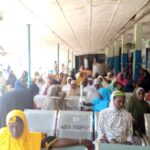Dr. Chidozie Grace is an optometrist and fellow of the Nigerian College of Optometrists and the LV Prasad Eye Institute, India. In this interview, she speaks on ways to tackle challenges in accessing eye care in Nigeria, implications of buying eye medications and reading glasses without doctor’s prescription, the recent commemoration of the World Optometry Day, among others.
What is the burden of blindness and visual impairment in Nigeria?
According to the Nigerian blindness and vision impairment survey of 2005 to 2007, it is estimated that 1.13 million individuals aged 40 were blind, while 4.2 million adults aged 40 were visually impaired. There is a high prevalence of blindness and severe visual impairment in Nigeria, especially among those aged more than 40.
What are the common causes of blindness and visual impairment in the country?
‘There is need for functional eye care facilities in PHCs across Nigeria’
FG launches public service entrepreneurship programme
They are age-related macular degeneration cataract, diabetic retinopathy, glaucoma and uncorrected refractive errors, which are responsible for 57 per cent of moderate visual impairment. An appropriate and accessible refraction by an optometrist needs to be provided to reduce the burden.
What puts people at risk of glaucoma, and how can it be prevented?
People can be at risk of glaucoma because of age (over 55 years); being of black heritage; family history of glaucoma; certain medical conditions such as diabetes, migraines, high blood pressure and sickle cell anaemia. Also, when corneas are thin in the centre.
How has the massive brain drain of professionals from Nigeria affected eye care in the country?
It has really led to the dearth of skilled eye care professionals. Entrepreneurs in the eye sector are shutting down their practices, which in turn is affecting Nigeria’s economy in loss of tax and reducing accessibility.
What is your assessment of access to eye care in the country in respect to facilities, equipment and specialists?
It is below standard. Most clinics are situated in urban areas, and the specialists are concentrated in the same areas as well. In terms of equipment, an update is necessary. Latest technologies should be advocated for.
The way out is that there is a need to have functional eye care facilities in the Primary Health Centres (PHCs) in all the local government areas in Nigeria. Adequate infrastructure and appropriate technologies should be provided.
The government should take away import duties from optometric equipment as this will ultimately reduce the burden on the patients.
What is your take on people buying eye medications and reading glasses without doctors or optometrists prescribing?
Buying eye medications and pairs of glasses, whether reading or otherwise, is detrimental to eye health. Some people have ended up having visual impairment or become blind from such practices.
The government should be more intentional in stopping these practices by sanctioning those found guilty of quack practices to serve as deterrent to others.
What is your advice to Nigerians on eye care?
Nigerians should always seek eye care early, and they should go to the professionals. They should also cultivate the habit of having a comprehensive routine eye examination with their optometrist once every year for those 40 years and above and once every 18 months for those less than 40 years. For eye care, early detection is key.
What do you think the government and other stakeholders should do to improve the practice of optometry in Nigeria?
They should provide adequate infrastructure and appropriate technologies for vulnerable groups to have easy access to better eye and clinical care.
More compelling consideration should be given to eye care patients, as well as the poor and vulnerable, who cannot afford the financial burden of vision loss and blindness. This can be done through an improved National Health Insurance Authority (NHIA). Without functional vision, the well-being, socio-economic and earning potential of people suffer greatly.
Also, the Nigerian Optometrist Association, FCT chapter, which I am a member, wishes that we could achieve universal eye health coverage such that everyone has optimal eye health free from vision loss and blindness. Also, that people with vision loss are able to develop their full potential through low vision rehabilitation.

 Join Daily Trust WhatsApp Community For Quick Access To News and Happenings Around You.
Join Daily Trust WhatsApp Community For Quick Access To News and Happenings Around You.


